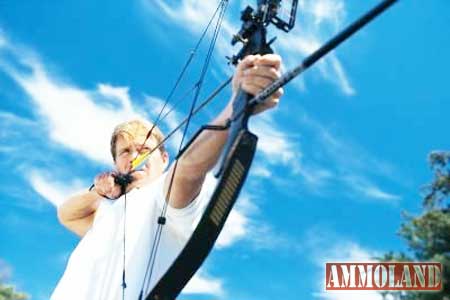By Alan Murdock

Manasquan, NJ –-(Ammoland.com)- On the compound bow there are a number of adjustments that you or a professional at your local outfitter can make to customize the bow to your ability.
Today I will cover how to identify a proper stance, how to measure your draw length in this stance, and finally, the draw weight in your bow.
On some new compound bows the draw length and draw weight can be adjusted to such a great degree that a bow can fit a teenager and, over time, be adjusted as the archer grows in strength and stature to remain his or her primary bow for hunting and sport in adulthood.
Draw length is the distance from your hand where it grips the handle on the riser to the corner of your mouth while you are standing in a proper archer’s stance.
Hold on! There’s a lot in that sentence. Proper archer’s stance? Why the corner of my mouth?
Let’s look at a video that explains the proper archer’s stance:
You can see from the video that you will stand with your side to the target. Your arm should extend straight from your shoulder toward the target with your feet shoulder-width apart and the leg closest to the target turned slightly out.
Once your arm and body are in proper alignment you reduce the likelihood you will “throw” the arrow when you release the string, knocking it off target.
Now you can measure your draw length. The reason you measure from your hand to the corner of your mouth is that it is directly below your eye, and it is a consistent reference point. When you sight, if the arrow is to the right or left of your eye it will have varied impact points to the left or right of the bullseye, depending on the distance of your target.
Another way to measure draw length is to measure your wingspan and divide by 2.5. It may be a good idea to determine your draw length both ways to see if they come out the same.
When the draw is anchored directly below your eye you only have to make adjustments for the effect of gravity on the arrow. In another article, I’ll address how to aim and how to use sights to make adjustments for gravity at various distances.
This video demonstrates how to measure draw length:
Draw weight is significant in that it determines how much force will be behind your arrow when you release the string, and how much force you will need to exert to draw back your bow. Many high-end bows advertise super fast speeds and the hardest-hitting arrows. Often these numbers can only be reached at a 75 or 80-pound draw, a weight that only the best-conditioned archers can effectively draw again and again. To grow as an archer and to enjoy the sport you should start with a manageable draw weight that allows you to shoot for 30 minutes to an hour and a half each time you go to the archery range.
To hunt large game you will need a draw weight of greater than 45 lbs. Lighter weights will result in more wounding hits and more lost game given accurate aim. Don’t worry if your strength is lower at this point. Many bows allow you to adjust the weight so that you can ramp up and progress while keeping the same bow.
The following video demonstrates how draw length and draw weight can be easily adjusted on a bow by one of the major manufacturers:
On a final note, most of the major manufacturers are building competitive bows that are highly adjustable. You don’t need to feel like you’ve got to buy the fastest and most aggressive bow on the market to be a successful archer. A bow that gives you significant flexibility is a great place to start, and it will give you a solid introduction to the sport. If you want to ramp up to the hottest new bow, that’s fine, but if you are new to the sport considering flexibility and growth in your first bow is an excellent place to start.
About Alan Murdock
Alan Murdock is a lifelong shooting enthusiast. From youth, he has shot firearms and archery. Today he is a certified NRA basic pistol instructor and Utah Concealed Firearms instructor. His blog on shooting and personal defense can be found at www.alanmurdock.wordpress.com
